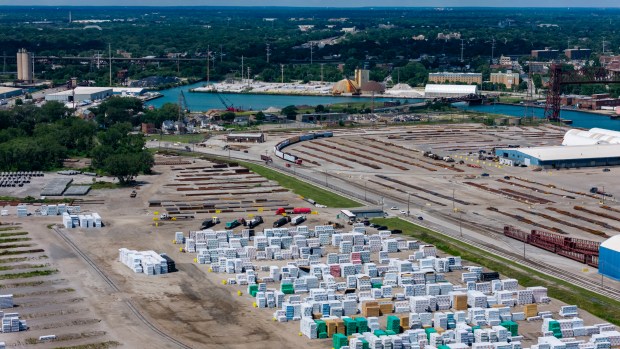After yearslong litigation from residents and activists, and following recent opposition from the state of Illinois, the U.S. Army Corps of Engineers announced Tuesday it was dropping a plan to expand a toxic waste dump on the Southeast Side of Chicago.
Over the next two decades, the proposed 25-foot vertical expansion along the Lake Michigan shoreline would have taken in an additional 1 million cubic yards of contaminated sediment dredged from the Calumet River — the Corps’ solution to the disposal site’s now-full 45 acres.
“This is very good news and a victory for Chicagoans and all of us who care about protecting healthy communities and Lake Michigan,” said Howard Learner, executive director of the Environmental Law and Policy Center and lead attorney for community groups in litigation against the Army Corps.
After denying the Army Corps all of the state water quality permits needed to proceed, the Illinois Environmental Protection Agency sent a letter saying the proposal was contrary to some environmental regulations, including an Illinois law that prohibits the construction of new landfills or the expansion of existing landfills in Cook County.
Learner said the agency’s proposal “defies common sense.”
In a news release, the Army Corps said it will work with the state, the city and the Illinois International Port District to explore “sustainable and feasible alternatives.”
The Army Corps has argued it needs somewhere to dispose of the sediment that has to be routinely dredged from the Calumet River so that commercial ships can pass through waterways connecting the Great Lakes to the Mississippi River basin.
When Alliance of the Southeast and Friends of the Parks sued the Army Corps in 2023, the community organizations claimed that the federal agency didn’t consider alternative locations for a new dump or adequately assess the risks of expanding the current site.
In the Tuesday news release, the Army Corps said it “remains committed to maintaining a safe and fully operational navigation system in Calumet Harbor and the Calumet River.”
The agency’s plan to manage dredging operations in the waterways and ensure commercial navigation was approved in 2020. The next year, Congress allocated funding for the vertical expansion of the disposal facility.
“The Corps remains committed to maintaining commercial navigation in the Calumet Harbor, Calumet River, and the Cal-Sag Channel,” said Col. Kenneth Rockwell, commander of the Chicago District. “We will work closely with federal, state, and local partners to explore alternative solutions that balance environmental considerations, economic needs, and the long-term viability of these waterways.”
In the Illinois EPA letter, acting director James Jennings urged the Army Corps “to explore alternative means to manage dredged materials,” including its disposal at permitted landfills or even “upland beneficial use,” which would entail its use on dry land for habitat creation, land reclamation, soil enhancement or even construction materials.
“The Army Corps will now need to find better and more sensible alternatives that are outside of Cook County and reduce the dredged waste to the extent practicable,” Learner said. “There are better solutions and better alternatives to the Corps’ flawed approach.”
Since 1984, the Army Corps has been dumping toxic sediment dredged from the Calumet River into the containment site, which contains mercury, arsenic and polychlorinated biphenyls or PCBs. After reaching capacity or after 10 years, whichever came first, the property was to be returned to the Chicago Park District to restore as a park for the largely Black and Latino community.
Four decades later, the property hasn’t been turned over.
“The Army Corps, Park District and City of Chicago should now work together to restore the site and transform it into the long-delayed new lakefront park for the public to use and enjoy,” Learner said. “Chicago’s lakefront is for people and parks, not toxic waste dumps.”
Check back for updates.



